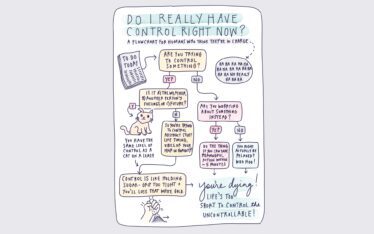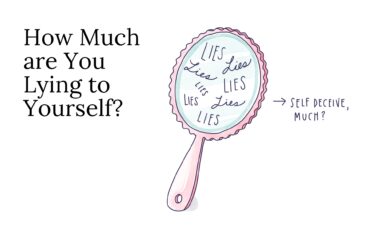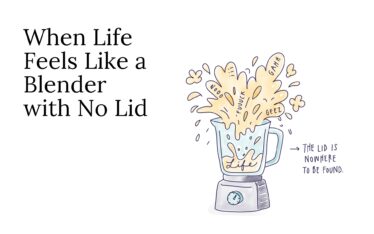I dare you to tell me you don’t like the idea of a life colored in with both absorbed enjoyment and meaning… a living-in-vivid-color kind of life where you sweep yourself off your feet with captivatingly engaging activities… a meaningful life that feels like your existence matters and has more than a pea-sized iota of purpose.
I know you want this, and you’re not the only one, because researchers have glommed onto this concept, researched the shit out of it, and called it vital engagement. Having an absorbing and meaningful relationship with life is in a league of positive experience of its own… and we want a piece of this action, pronto.
Flow + Meaning = Vital Engagement
Flow — the aforementioned state of interested absorption in an activity — can exist in the absence of meaning (as anyone who has ever played an engrossing game of Wordle can attest). Meaning — the aforementioned feeling that we have a purpose for being on planet Earth in any way, shape, or form — can exist without being in the revered state of flow. But when perceived significance and flow theory combine forces, we’re poised for the well-being phenomenon known as vital engagement to rain down upon us. Let it pour! But how?
The push and pull of meaning
Meaning in life can emerge from both ‘push’ and ‘pull’ experiences.
Push experiences are a little more abrupt, and, well, pushy… like the unexpected death of beloved uncle Lester, getting sacked out of nowhere from a job, getting cheated on, and all sorts of other slaps in the face from minor and major traumas that just might lead to post-traumatic growth if we’re lucky. Life is full of push experiences and thankfully the silver lining of this garbage is that is typically yields a modicum of meaning. Uncle Lester dying might help you grasp the carpe diem mindset… getting fired might push you towards becoming the firefighter you always wanted to be… and finding out your partner was stepping out on you might inspire you to set fire to them love yourself without the validation from someone else. We usually do a decent job of making meaning from the “things that happen to us.”
The pull model for the genesis of meaning accounts for the enjoyable absorption of flow. The act of keenly exploring the world is the very thing that motivates us to keep coming back for even more flow-like experiences, and long-term engagement in flow activities sows the seeds for meaning to then take root and bloom. Said simply, flow creates a pathway to meaning. So getting swept up in learning how to play the piano, for example, might pull you into a vortex of meaning that makes you laugh, feel challenged, feel accomplished, and maybe even process your grief over losing Uncle Lester.
Leisure leads the way
We can get our mitts on vital engagement through leisure-filled activities that might seem downright hedonic (join me, fellow pleasure-seekers, with a “hip hip hooray” for hedonism!). The amount of time we devote to leisure — those wonderfully discretionary endeavors that optimize our sense of well-being — has been shown as one of the more robust correlates of life satisfaction, which should come as no surprise to those of us who’ve been known to revel in our free time.
According to psychology researchers, leisure pursuits play an important role in providing meaningful engagement in life through several interconnected themes:
- A Joyful life, ripe with the cultivation of all the glowy positive emotions we love to love (joy! gratitude! bliss! serenity! etc.!). Taking a leisurely ferry to Capri (next time you pop over to the Amalfi Coast) guarantees the joyful life if you’re mindful of the experience as it’s happening (so, not reading your emails the whole time) and if you savor the shit out of it afterwards (savoring even the smallest pleasures, like remembering the pistachio gelato served on the ferry with the twee little shovel spoon). What activities bring you joy?
- A Connected life, which unsurprisingly is not all about you. Some psychologists say “the essence of meaning is connection,” so meaning can be made through activities that involve other people for social connection (it’s so unfun to play pickleball alone), by going to church or out for a long hike for spiritual connection, or by attending a local art festival for cultural connection. What activities give you that feeling of connection?
- A Composed life, where we can choose leisure activities that give us the control and autonomywe might not be able to find in our wildly flailing, micromanaged jobs. Studies highlight the meaning derived from the art of ikebana (Japanese flower arranging), particularly for its ability to create calmness, control, and composure. One of my ultra-stressed clients loves coloring books for the way they help center her thoughts as she colors in the lines with precision. What activities make you feel composed and in control?
- An Empowered life, which helps us heal and cope from stress and adversity. Playing your favorite board game with your family might be your way to remedy stress (okay, who are we kidding: doesn’t playing Monopoly with people you’re related to cause stress?). Some people might pick up hobbies that make them feel strong and successful in the face of an otherwise crumbling existence. One of my clients feels like a champion after every Peloton ride, which helps to build her confidence. What activities make you feel empowered?
- A Discovered life, which leads to a life of meaning through the exploration and expression of our unique talents and characteristics. Discovering and then using our strengths is a slam-dunk towards well-being, and it also leads to vital engagement. Creative leisure allows for self-expression that’s crucial for many of us to feel alive. I feel a heartwarming sense of significance in our universe when I’ve created a piece of art, especially if I give it away. What activities give you that sense of inner wholeness?
Fitting leisure in
The concept of time affluence — the feeling that we have enough time to participate in the activities that truly matter to us — has been shown by researchers to positively relate to subjective well-being. (Mothers everywhere are laughing sardonically at this concept right now, I just know it.) People higher in time affluence report spending more time engaged in personal growth activities, connecting with others, and participating in physical fitness activities — all things that check the boxes for vital engagement.
Studies show that having too little leisure time leads to increased stress (duh) and yet having too much discretionary time erodes our sense of accomplishment and purpose; finding the ‘zest zone’ of discretionary time appears to be of uber importance to optimize our well-being.
How does this all relate to memento mori (remembering that we’re going to die)?
Oh! I’m so glad you asked that.
What we know to be true about ontological confrontation (the fancy word for facing the reality that you’re a ticking time bomb) is that it sparks a sense of temporal scarcity — that “oh shit, time is running out so it feels much more valuable now” kind of feeling. Our priorities are more finely tuned in the face of a perceived expiry date on life. By counting our Mondays left, for example, we can reprioritize how we want to spend those remaining weeks — picking up activities that can simultaneously bring us pleasure (like the hobby of learning how to paint) and also deepening meaning (by connecting with others at art class, gifting a portrait to a friend on her birthday, feeling a sense of accomplishment for finally painting a face that doesn’t look like a rotten vegetable, etc.).
Existential psychologists tell us that engagement is the salve for the problem of meaninglessness; when we fully engage in a host of endeavors — like caring about people and projects, participating in activities to learn, grow and create new things — we fully show up in our lives. This commitment to showing up for life alleviates the nagging anxiety of lack of meaning, and more gutturally, the problem of life’s crappy-yet-true finitude. This decision to really take part in our lives is what connects the dots between vitality and meaning; by playing full-out, and not sitting on the sidelines of our lives, we turn the dial up on feeling alive and consequently fuel the fires of meaning.
Leisure is a meaning-making activity. What activity can you take part in today to create a meaningful engagement with life? I’m going to make a giant canvas painting that may or may not make me feel a sense of accomplishment (because it could turn out horribly)… but it’ll be meaningfully horrible — of that I’m sure.







